剑桥国际英语教程5
《剑桥国际英语教程五版》IC5 教材简介
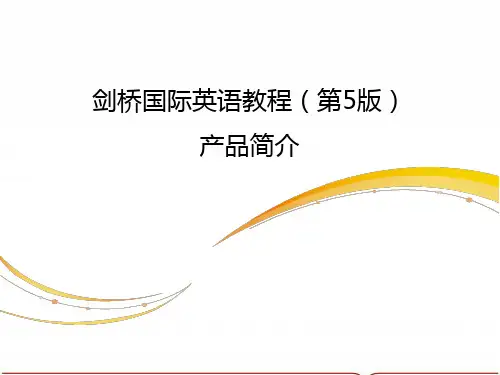
词汇 &惯用语
·每个单元的活用型词汇和常用表达
15
在线互动学习平台 https:///main/p/splash
游戏
• 共7种游戏形式,其中2种主要练习单词和短语,另外5种主要练 习句型或常用表达。
• 每个单元有4个游戏,多数游戏分低中高三个等级,不仅具有挑 战性、趣味性和互动性,还能自动评分,为学生提供全新的学习 体验。
• 曾在世界多个国家和地区的大学任教,包括新西兰、加拿大、 印尼、新加坡、中国香港和美国。
3
合著者:
乔纳森·赫尔(Jonathan Hull) 曾在英国、日本、美国、中国、泰国等地任教。主要学术领域为:课程设置、教材设计 以及内省法在应用语言学中的运用。 苏珊·普罗克特(Susan Proctor) 曾在日本、中国和美国等地的大学任教。专门教授写作课程,并致力于对课程设置和教 材设计的研究。
识
·通过讨论、信息沟和游戏等交流活动提高语言 流利度
Grammar plus 语法补充
·更深入地学习单元语法 ·提供控制型练习来练习语法 ·可在课堂上完成或作为家庭作业
12
Progress check复习单元
·每两个单元之后有一个复习单元 ·学生对自己在重要语言技能方面的进步进行自我评估 ·通过听力、讨论、口语和角色扮演等活动为学生进一步提供听 说机会,从而提高语言流利度
13
练习册
Vocabulary词汇
·提供基于单元主题的词汇练习
Reading阅读
·提供基于单元主题的补充阅读练习 ·通过读前活动介绍语篇 ·强化学生用书中采用的阅读技巧
Writing写作
·引导更自由、更个性化的写作练习 ·强化单元词汇和语法
Grammar语法
剑桥国际英语教程-Interchange1-Unit-5精选全文
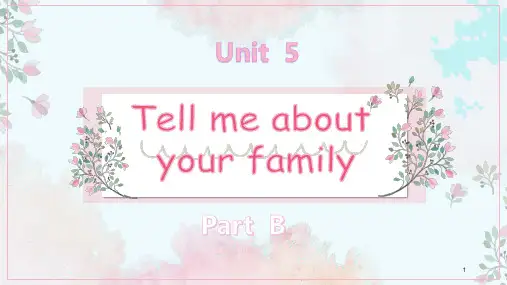
Love,
Jasmine
24
• housework [ˈhaʊswɜrk] n.the work that people do to take care of the home, such as cleaning.
• after-school program activities for children after school.
• household chores ([t'ʃɔz] a task that you must do but that you find unpleasant or boring.) the work that children do to help their parents at home, such as washing the dishes.
Mer-li: Actually, I’m an only child. Marcos: Really? Mer-li : Yeah, most families in China have only one child nowadays. Marcos: I didn’t know that. Mer-li : What about you, Marcos? Marcos: I come from a big family. I have three brothers and two sisters. Mer-li : Wow! Is that typical in Peru? Marcos: Not really. A lot of families are smaller these days. But big
6
➢ M: Cindy, cindy. ➢ C: Sorry, mom. That's my favourite song. Do you
剑桥国际英语教程5修订版教师用书
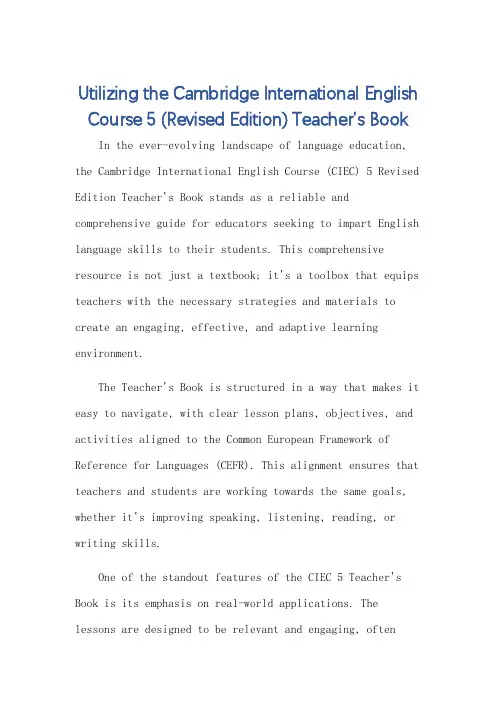
Utilizing the Cambridge International English Course 5 (Revised Edition) Teacher's Book In the ever-evolving landscape of language education, the Cambridge International English Course (CIEC) 5 Revised Edition Teacher's Book stands as a reliable and comprehensive guide for educators seeking to impart English language skills to their students. This comprehensive resource is not just a textbook; it's a toolbox that equips teachers with the necessary strategies and materials to create an engaging, effective, and adaptive learning environment.The Teacher's Book is structured in a way that makes it easy to navigate, with clear lesson plans, objectives, and activities aligned to the Common European Framework of Reference for Languages (CEFR). This alignment ensures that teachers and students are working towards the same goals, whether it's improving speaking, listening, reading, or writing skills.One of the standout features of the CIEC 5 Teacher's Book is its emphasis on real-world applications. The lessons are designed to be relevant and engaging, oftenincorporating real-life scenarios and contemporary topics that resonate with students. This approach not only makes learning more enjoyable but also more meaningful, as students can see how the language they are learning can be applied in real-world situations.Another noteworthy aspect is the focus ondifferentiated instruction. The Teacher's Book provides options and extensions for each lesson, allowing teachers to tailor the content to the needs and abilities of their students. This flexibility is crucial in today's diverse classrooms, where students come from different backgrounds and have varying levels of proficiency in English.The inclusion of a wealth of teaching resources, such as worksheets, activities, and games, further enhances the teacher's ability to create a dynamic and interactive learning environment. These resources are not just limited to the printed pages; they often include digital components that can be easily integrated into modern classrooms, taking advantage of technology to make learning more engaging and accessible.Moreover, the Teacher's Book emphasizes the importanceof assessment and provides guidance on how to effectively evaluate students' progress. With clear criteria and suggestions for formative and summative assessments, teachers can track their students' progress and identify areas where further support is needed.In conclusion, the Cambridge International English Course 5 Revised Edition Teacher's Book is an invaluable resource for any teacher looking to deliver high-quality English language instruction. It provides a solidfoundation in language skills, while also encouraging creativity and critical thinking. With its focus on real-world applications, differentiated instruction, and awealth of teaching resources, this Teacher's Book is amust-have for any educator seeking to enhance theirteaching practice and improve their students' language outcomes.**《剑桥国际英语教程5修订版教师用书》的应用** 在持续变化的语言教育领域中,《剑桥国际英语教程》(CIEC)5修订版教师用书作为一本可靠而全面的指南,为寻求向学生传授英语技能的教育工作者提供了有力的支持。
剑桥国际英语教程5答案unit2
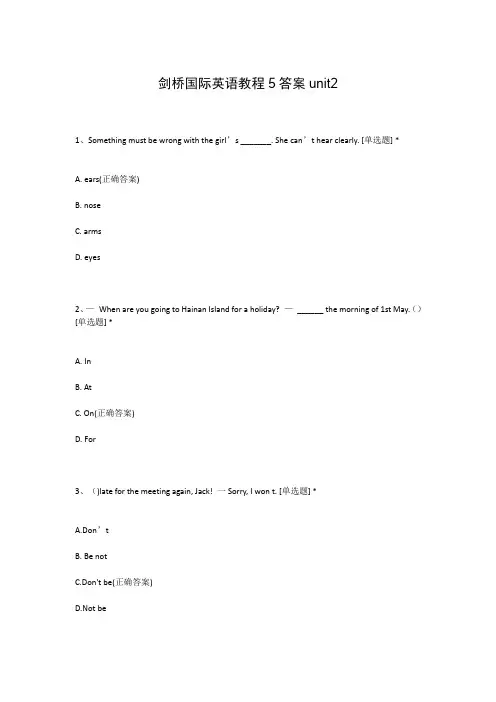
剑桥国际英语教程5答案unit21、Something must be wrong with the girl’s _______. She can’t hear clearly. [单选题] *A. ears(正确答案)B. noseC. armsD. eyes2、—When are you going to Hainan Island for a holiday? —______ the morning of 1st May.()[单选题] *A. InB. AtC. On(正确答案)D. For3、()late for the meeting again, Jack! 一Sorry, I won t. [单选题] *A.Don’tB. Be notC.Don't be(正确答案)D.Not be4、You _____ smoke in the library, or you will be driven away. [单选题] *A. can'tB. mustn't(正确答案)C. will notD. may not5、We are living in an age()many things are done by computer. [单选题] *A. thatB. whichC. whyD. when(正确答案)6、Hearing that he had passed _____ health examination, he immediately made _____ call to his parents. [单选题] *A. a; /B. the; /C. the; a(正确答案)D. a; the7、The firm attributed the accident to()fog, and no casualties have been reported until now. [单选题] *A. minimumB. scarceC. dense(正确答案)D. seldom8、A brown bear escaped from the zoo, which was a()to everyone in the town. [单选题] *A. HarmB. violenceC. hurtD. threat(正确答案)9、Both Mary and Linda don't care for fish. [单选题] *A. 喜欢(正确答案)B. 关心C. 照料D. 在乎10、My daughter is neither slim nor fat and she’d like a _______ skirt. [单选题] *A. largeB. medium(正确答案)C. smallD. mini11、He gathered his courage and went on writing music. [单选题] *A. 从事B. 靠······谋生C. 继续(正确答案)D. 致力于12、John and Jack had looked for the key, but _____ of them found it. [单选题] *A. noneB. neither(正确答案)C. bothD. either13、The rain is very heavy _______ we have to stay at home. [单选题] *A. butB. becauseC. so(正确答案)D. and14、They all choose me ______ our class monitor.()[单选题] *A. as(正确答案)B. inC. withD. on15、33.Body language is even___________ and ___________ than any other language. [单选题] *A.stronger, loudB.strong, louderC.strong, loudD.stronger, louder (正确答案)16、——Can you come on Monday or Tuesday? ——Im afraid()of them is possible. [单选题] *A.neither(正确答案)B. eitherC. noneD.both17、My father can?_______ a little English. [单选题] *A. speak(正确答案)B. sayC. talkD. tell18、You should _______ your card. [单选题] *A. drawB. depositC. investD. insert(正确答案)19、Its’time to go to bed. _______ your computer, please. [单选题] *A. Turn onB. Turn inC. Turn off(正确答案)D. Turn down20、It’s raining outside. Take an _______ with you. [单选题] *A. cashB. life ringC. cameraD. umbrella(正确答案)21、Chinese is one of ____ most widely used languages in ____ world. [单选题] *A. a, theB. /, theC. the, the(正确答案)D. a, /22、6.—How can we get to the school?—________ bus. [单选题] *A.ToB.OnC.By(正确答案)D.At23、77.You can watch TV when you finish________ your homework. [单选题] * A.to doB.doC.to doingD.doing(正确答案)24、64.Would you like to drink ________?[单选题] *A.something else(正确答案)B.anything elseC.else somethingD.else anything25、Which do you enjoy to spend your weekend, fishing or shopping? [单选题] *China'shigh-speed railways _________ from 9,000 to 25,000 kilometers in the past fewyears.A. are growing(正确答案)B. have grownC. will growD. had grown26、You can distinguish the twins very easily, _____Tom is quite while Jack is active. [单选题] *A. soB. butC. for(正确答案)D. and27、The students in that university are not fewer than()in our university. [单选题] *A. the oneB. thatC. themD. those(正确答案)28、Just use this room for the time being ,and we’ll offer you a larger one _______it becomes available [单选题] *A. as soon as(正确答案)B unless .C as far asD until29、If you want to be successful one day, you have to seize every _______ to realize your dream. [单选题] *A. changeB. chance(正确答案)C. chairD. check30、I arrived _____ the city _____ 9:00 am _______ April [单选题] *A. at, in, atB. to, on, atC. in, or, atD. in, at, on(正确答案)。
剑桥标准英语教程和剑桥国际英语教程
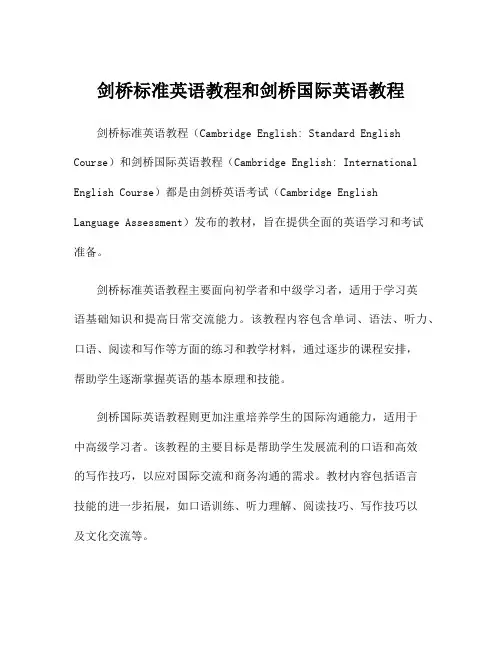
剑桥标准英语教程和剑桥国际英语教程
剑桥标准英语教程(Cambridge English: Standard English Course)和剑桥国际英语教程(Cambridge English: International English Course)都是由剑桥英语考试(Cambridge English Language Assessment)发布的教材,旨在提供全面的英语学习和考试
准备。
剑桥标准英语教程主要面向初学者和中级学习者,适用于学习英
语基础知识和提高日常交流能力。
该教程内容包含单词、语法、听力、口语、阅读和写作等方面的练习和教学材料,通过逐步的课程安排,
帮助学生逐渐掌握英语的基本原理和技能。
剑桥国际英语教程则更加注重培养学生的国际沟通能力,适用于
中高级学习者。
该教程的主要目标是帮助学生发展流利的口语和高效
的写作技巧,以应对国际交流和商务沟通的需求。
教材内容包括语言
技能的进一步拓展,如口语训练、听力理解、阅读技巧、写作技巧以
及文化交流等。
两者之间的区别主要在于教学深度和应用方向。
剑桥国际英语教程更侧重于培养学生的国际交流能力,重点放在文化差异和商务交流等实际应用场景上,而剑桥标准英语教程则更关注英语基础知识的学习和提高日常生活交流能力。
剑桥国际英语教程第5版学生包答案练习册答案
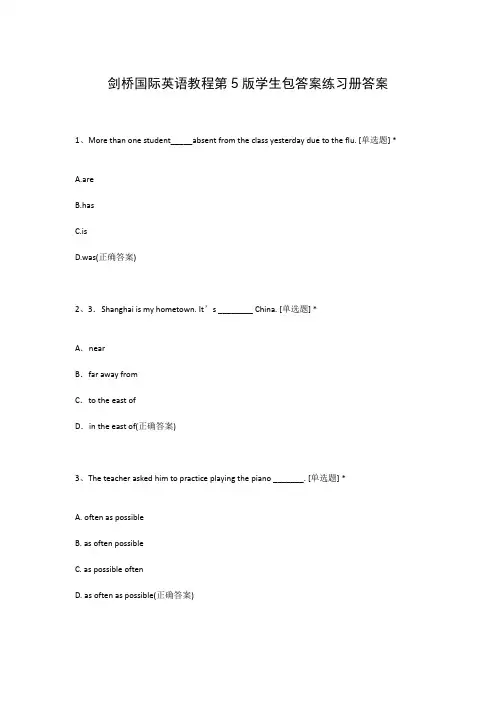
剑桥国际英语教程第5版学生包答案练习册答案1、More than one student_____absent from the class yesterday due to the flu. [单选题] *A.areB.hasC.isD.was(正确答案)2、3.Shanghai is my hometown. It’s ________ China. [单选题] *A.nearB.far away fromC.to the east ofD.in the east of(正确答案)3、The teacher asked him to practice playing the piano _______. [单选题] *A. often as possibleB. as often possibleC. as possible oftenD. as often as possible(正确答案)4、The weather forecast says that we’ll have occasional rain tomorrow. [单选题] *A. 偶尔的B. 不停的C. 少量的(正确答案)D. 不可预测的5、I don’t like snakes, so I ______ read anything about snakes.()[单选题] *A. alwaysB. usuallyC. oftenD. never(正确答案)6、Every year Carl _______ most of his time swimming, camping and traveling with his parents. [单选题] *A. is spendingB. spentC. will spendD. spends(正确答案)7、I always make my daughter ______ her own room.()[单选题] *A. to cleanB. cleaningC. cleansD. clean(正确答案)8、Every morning John takes a()to his office. [单选题] *A. 20-minutes' walkB. 20 minute ' walkC. 20-minutes walkD. 20-minute walk(正确答案)9、—Is there ______ else I can do for you? —No, thanks. I can manage it myself.()[单选题] *A. everythingB. anything(正确答案)C. nothingD. some things10、She was seen _____ that theatre just now. [单选题] *A. enteredB. enterC. to enter(正确答案)D. to be entering11、He couldn’t ______ the maths problem without your help. [单选题] *A. work out(正确答案)B. work atC. work forD. work with12、The old woman doesn’t feel _______ though she lives _______. [单选题] *A. alone; lonelyB. alone; aloneC. lonely; lonelyD. lonely; alone(正确答案)13、23.Hurry up! The train ________ in two minutes. [单选题] *A.will go(正确答案)B.goC.goesD.went14、The black coal there shows a sharp()white snow. [单选题] *A. contract withB. content withC. contact toD. contrast to(正确答案)15、He went to America last Friday. Alice came to the airport to _______ him _______. [单选题] *A. take; offB. see; off(正确答案)C. send; upD. put; away16、It was()of you to get up early to catch the first bus so that you could avoid the traffic jam. [单选题] *A. senselessB. sensible(正确答案)C. sentimentalD. sensitive17、I have only two tickets for TF Boys’concert. ______ you ______ he can go with me.()[单选题] *A. Either; or(正确答案)B. Either; norC. Both; andD. Not only; but also18、Becky is having a great time ______ her aunt in Shanghai. ()[单选题] *A. to visitB. visitedC. visitsD. visiting(正确答案)19、I usually do some ____ on Sundays. [单选题] *A. cleaningsB. cleaning(正确答案)C. cleansD. clean20、Bob is young, _______ he knows a lot. [单选题] *A. becauseB. soC. but(正确答案)D. unless21、Will you be able to finish your homework _______? [单选题] *A. by the timeB. in time(正确答案)C. once upon a timeD. out of time22、He always did well at school _____ having to do part-time jobs every now and then. [单选题] *A despite ofB. in spite of(正确答案)C. regardless ofD in case of23、Kate has a cat _______ Mimi. [单选题] *A. called(正确答案)B. callC. to callD. calling24、Jim, it’s dark now. Please _______ the light in the room. [单选题] *A. turn on(正确答案)B. turn upC. turn offD. turn down25、It _____ us a lot of time to do this job. [单选题] *A. spentB. madeC. took(正确答案)D. cost26、92.China is a big country ________ a long history. [单选题] * A.hasB.haveC.with(正确答案)D.there is27、( ) .Would you please ______me the gifts from your friends? [单选题] *A.to showB. showingC. show(正确答案)D. shown28、You could hardly imagine _______ amazing the Great Wall was. [单选题] *A. how(正确答案)B. whatC. whyD. where29、--Do you know _______ girl with long curly hair?--Yes. She is Mary. She plays _______ piano very well. [单选题] *A. a; /B. the; /C. the; the(正确答案)D. a; the30、I couldn’t find Peter,_____did I know where he had gone. [单选题] *A.nor(正确答案)B.eitherC.neverD.as。
剑桥标准英语教程 教案 Unit 5 growing up
Unit 5 Growing upTeaching objectivesIn this unit, Ss learn how to …◆use the simple past in statement and questions (review).◆use time expressions to talk about the past.◆use all, most, a lot of, a few, etc.◆talk about memories of childhood, school, and your teenage years.◆Correct yourself with expressions like Wait, Actually, and I mean. Main Points of Teaching◆Enable Ss to talk about memories of childhood, school, and teenageyears.Difficult Points of Teaching◆Enable Ss to use the simple past and time expressions to talk aboutthe past.Teaching Periods6 teaching hoursTeaching proceduresUnit opening pageIntroduce the theme of the unit This unit is about growing up. Growing up is about changing from a baby to a teenager to an adult. Growing up is about getting older, but it’s also about experiences in your life and things that you did, like starting school or learning to do sth.In Unit 3, you learn how to…⏹Unit aims Read the unit aims aloud. Tell Ss to listen and read along. Before you begin…⏹Introduce the memories⏹Say, “Look at the pictures. Do u have very strong memories of any ofthese things?”Have several Ss tell the class which they remembermost.⏹Write sleepover with your friends on the board. Ask, “What words orexpressions do u think of when u think about sleepovers?” Write Ss’suggestions on the board (e.g., laugh, talk, stay up late, pizza, TV, music, parents).⏹Write learning to swim on the board. Ask, “What words orexpressions do u think of when u think about learning to swim?”Write Ss’suggestions on the board (e.g,, water, lake, pool, splash, mouthful, fun)⏹Write got into trouble on the board. Ask, “What words or expressionsdo u think of when u when u think about a time when u got into trouble?” Write Ss’ suggestions on the board.Lesson A Childhood1 Getting started⏹Ste the scene Ask several Ss, “Where are u from? Did u ever live inany other place?” Write the names of Ss who answer yes on the board.Ask, “What questions can u ask these classmates to learn more?” Call on a few Ss to answer.A⏹Preview the task⏹Play the recording Ss listen and write their answers.⏹Have Ss compare their answers in pairs. Check answers with theclass.B⏹Preview the task⏹Write as column headings on the board: Period of Time, SpecificPoint in Time.Say, “Read the conversation and find places where Ling talks about time. Are they periods of time or specific points in time?”⏹Have Ss call out the time references in the conversation, and writethem on the board under the correct column heading.⏹Do the task. Have Ss complete the task and then compare theiranswers in pairs. Check answers with the class.2 Grammar⏹Present the grammar chart⏹Understand the grammar Tell Ss to look at the chart. Explain that itreviews the simple past of verbs, including be, affirmative and negative statements, yes-no questions, short answers, and information questions.⏹Present Saying Years Read each year aloud, and have Ss repeat.⏹Say, “Use the simple past to talk about events that ended before now.We usually use a time expression to say when something happened in the past. Some are simple words or phrases, like yesterday or last year.Some have patterns.”A⏹Preview the task Read the instructions aloud. Have Ss complete thetask and then compare their answers in pairs. Check answers with the class.B⏹Preview the task Read the instructions aloud. Have Ss complete thetask. Check answers with the class.3 Speaking naturallyA⏹Preview the task Say, “When people use did you, they often say itquickly and the two words sound like one word.”Read the instructions aloud.⏹Play the recording Ss listen and repeat.B⏹Preview the task Say, “Listen and complete the questions about yourchildhood vacations.”⏹Play the recording Ss listen and write the answers.⏹Play the recording again Ss listen and review their answers. Checkanswers with the class: ask individual Ss to read the complete question, reducing did you.⏹Tell Ss to take turns asking and answering the questions in pairs. Lesson B Favorite classes1 Building language⏹Ste the scene Ask, “What language are u learning now?”Call on afew Ss. Ask a few Ss to say why people study another language.A⏹Preview the task Say, “Keiko, Paul, Brad, and Mirka are talkingabout languages they learned in school. What language did each study?Listen and write the answers.”⏹Play the recording Ss listen and write the languages.⏹Check answers with the class.B⏹Preview the task⏹Do the task Read the instructions aloud. Have Ss complete thesentences. Tell Ss to use the paragraphs for help. Check answers with the class2 Grammar⏹Present the grammar chart Play the recording. Ss listen and repeat.⏹Understand the grammar Tell Ss to look at the left side of the chart.Ask a S to read the words that talk about how many. Tell Ss that these words are determiners. They are sometimes called quantifiers because they tell how many.⏹Tell Ss to look at the right side of the chart. Ask a S to read the wordsthat talk about how many. Say, “What comes before the nouns on this side of the chart?”⏹Write on the board:A Most students have to take exams.B Most of the students in our class have to take exams.A Some students are good at languages.B Some of the students in my class are good at languages.Say, “Read the first pair of sentences. Do they have the same meaning?”(no) “Does the second pair of sentences have the same meaning?” (no)⏹Ask, “Which sentences talk a smaller, more specific number ofstudents?”(the B sentences) Say, “Look at the B sentences. What word comes after some and most?” (of) “What word follows of?” (the) ⏹Explain, “The A sentences are more general. The B sentences aremore specific and talk about a smaller group of people that is morespecifically identified.”⏹Point out a lot of. Say, “A lot is different. For both general andspecific statements, you have to use of.”⏹Have Ss look at the sentences on the right side of the chart again andthen look at the column that shows the object pronouns. Ask, “In the first sentence, who does them refer to?” (the children in my town) Ask about the other pronouns in the list.⏹Say, “When you use these determiners with object pronouns, youhave to use of.”⏹Preview and do the task.3 Building vocabulary⏹Set the sceneA⏹Preview the task⏹Play the recording Ss listen and repeat. Help with new vocabulary asneeded. Ask, “Can u think of other subjects and categories?” As Ss call them out, add them to the board.⏹Ask, “Which subjects are u interested in?”Ask several Ss.Alternatively, put Ss in groups to discuss. Have groups report to the class on the subjects in which Ss are most interested.B⏹Preview and do the taskLesson C Well, actually,…1 Conversation strategy⏹Set the scene Say, “Ben and Jessica are talking about some of Ben’smemories of growing up. Look at the picture carefully. Can u guess what they talk about?”A⏹Preview the task Tell Ss to look at the A/B dialogue and try to thinkof possible ways to complete the answers. Have a few Ss read their answers, and ask Ss with the same answer to raise their hands.⏹Tell Ss to practice the A/B conversations in pairs, using their ownanswers and taking turns playing each role.⏹Say, “Listen to Ben and Jessica’s conversation. What does Benremember about his first day of school?” Tell Ss not to write anything down the first time they listen.⏹Play the recording Books open. Ss listen and read along.⏹Play the recording again Ss listen and write a few words about whatBen remembers.⏹Play the recording again Check answers with the class.⏹Ask Ss to read the conversation again and see if any of the topics theyguessed earlier are in the conversation. As Ss call them out, circle them on the board.⏹Practice Have Ss practice the conversation in pairs.B⏹Preview the task Have Ss read the sentences and replies.⏹Do the task2 Strategy plus⏹Present Strategy plus Read the instructions aloud. Ask Ss to find theexample of I mean in the conversation on p. 48. Have a pair of Ss read Jessica’s question and Ben’s answer aloud.⏹Present In ConversationA⏹Preview the task Read the instructions and the example aloud. TellSs to read the list of questions and the list of words on the right. Help with new vocabulary as needed.⏹Do the taskB⏹Preview the task Read the instructions aloud. Then have one pairread the example conversation.⏹Do the task Have Ss ask and answer the questions continuing theirconversations. Go around the class, and help as needed.3 Listening and speakingA⏹Preview the task Read the instructions aloud.⏹Play the recording Ss listen and complete the task.⏹Play the recording again Ss listen again review their answers. Checkanswers with the class.B⏹Preview and do the taskLesson D Teenage years1 Reading⏹Set the scene Read the title of the lesson aloud. Ask, “Do u enjoybeing a teenager? What’s your best memory from your teenage years so far?” Get ideas from Ss.APrereading⏹Preview the task⏹Do the task Have Ss work in pairs and write their own lists. Give Sstwo minutes to brainstorm as many ideas as they can. When Ss finish, have pairs call out 2 or 3 of their ideas, and add them to the ideas on the board. Find out which pair listed the most things.BDuring reading⏹Preview the reading Books closed. Say, “Imagine u want tointerview a relative or family friend about their memories of being a teenager. What questions can u ask?” Have Ss call out their ideas, and write them on the board.⏹Books open. Say, “This is an interview with someone about hermemories of being a teenager. Each paragraph starts with a question.Compare the questions in the interview with the ones on the board.Which are similar?” Have Ss scan the questions and call out any that are similar. Circle them on the board.⏹Do the reading Say, “Read the interview. Which of Jennifer’sanswers are funny? Which are interesting? Write down at least one funny answer and one interesting answer.” Tell Ss that the blanks in the interview are for the talk in Part C.⏹When Ss finish reading, have them work in pairs and tell theirpartners which of Jennifer’s answers they chose as funny or interesting and why. Check answers with the class.⏹Do the reading again Tell Ss to read the article again and underline 3words or expressions they think are useful to know. Ask Ss to call out those words or expressions. Explain them.CPostreading⏹Preview the task Read the instructions. Have different Ss each read asentence.⏹Tell Ss that each sentence fits into one blank in the interview. Do No.1 with the class.⏹Do the task Have Ss add the other sentences to the interview. Checkanswers with the class.2 Listening⏹Preview the task Read the instructions aloud. Have Ss read thesentences. Make sure they understand them. Tell Ss not to write anything the first time they listen.⏹Play the recording Ss listen to the interview.⏹Play the recording again Ss listen and circle the correct answers.Have Ss compare their answers in pairs. Check answers with the class.3 WritingA⏹Preview the task⏹Do the task Have Ss write the five questions.B⏹Present the Help note⏹Preview the task Read the instructions aloud. Tell Ss to read theexample interview question and answer.⏹Have Ss ask u some of the questions they wrote in Part A. Answersome using except (for) and apart from.⏹Do the task Have Ss exchange questions with a classmate and writetheir answers.。
剑桥国际英语教程入门级unit5
3.If the base form ends with a silent e ,drop the e and add-ing 以不发音字母e结尾的动词,去掉e,再加ing Have +ing (-e) having Ride+ing(-e) riding
Present continuous wh-questions
A: What time is it ?
Pair work
B: It's twenty after two.
in the morning=1:00 A.M.to noon
It’s five after five in the morning./It’s 5:05 A.M.
in the afternoon=noon to about 5:00 P.M.
e.g. Where are you working? I’m working in a farm.
work with 与..共事;对..有效 work on 影响;继续工作; 从事; work hard 辛勤工作 work out 解决;算出;实现 What are you working on? 忙于 I’m sitting on my bed with my laptop computer. 笔记本电脑 I’m in an internet cafe with my friend Carmen.I’m having coffee and she’s reading a magazine. 上网咖啡厅(源于法国) He’s mowing the lawn. 修剪草坪 mow v.修剪 +ing mowing He’s playing soccer in the park. 足球
interchange剑桥国际英语教程入门级 Unit4-Unit5综合试题和练习集锦
I. Choose the correct answer.单项选择.(10’)( ) 1. Look ! There is __________ big apple on the floor .A. aB. anC. three( ) 2. _________ are running in the park .A. Jack and Jim .B. Mr. BlackC. Amy’s mother( )3. ______ they angry?A. isB. areC. am( ) 4.Where are ______ books? They are on the chair.A Tony'sB TonyC .Tonys( ) 5.-What’re?- They’re boots.A. theseB. thisC. thereII. Read and fill in the blanks with “ am, is, are”. 用be动词,am, is, are 填空。
(10’)Pat: Great! Our clothes ____dry. Where _____ my new blouse?Julie: What color____ it?Pat: It____ whiteJulie: Here _____a light blue blouse. ____it yours?Pat: No, it ______not mine.... Wait. It is mine. It's a disaster!Julie: Oh, no! All our clothes ______ light blue.Pat: Here's the problem. It's these new blue jeans. Whose jeans _________they? Julie: Uh, they_____ mine. Sorry.III. Read and choose 选词填空(5’)1. Is this ____________( his/ he) jacket?2. These are not ____________(you/your)gloves.3. Hey! These are not _________(our/ours)clothes.4.- Is this Jennifer’s hat? - No, it’s not______(her/hers)5. These shoes are _______(your/yours).IV.Fill in the blanks with “a” or “an”.用“a”或者“an”填空。
剑桥国际英语教程第五版3学生包答案
剑桥国际英语教程第五版3学生包答案1、Its’time to go to bed. _______ your computer, please. [单选题] *A. Turn onB. Turn inC. Turn off(正确答案)D. Turn down2、We had ____ wonderful lunch last Saturday. [单选题] *A. /B. theC. oneD. a(正确答案)3、Bliss, who worked in an information centre, began to work on the book in 1 [单选题] *A. 策划B. 上班C. 写作(正确答案)D. 销售4、55.There is a ________ on in the bookshop. Let's go to buy some books. [单选题] * A.movieB.matchC.sale(正确答案)D.concert5、()it is to have a cold drink on a hot day! [单选题] *A. What a great funB. How great funC. What great fun(正确答案)D. How a great fun6、I_____you that I had made the right decision. [单选题] *A.ensuredB.insuredC.assured(正确答案)D.for sure7、Tom didn’t _______ his exam again. It was a pity. [单选题] *A. winB. pass(正确答案)C. beatD. Fail8、66.—How much meat do you want?—________.[单选题] * A.Sorry, there isn't anyB.I can't give you anyC.Half a kilo, please(正确答案)D.Twelve yuan a kilo9、I gave John a present but he gave me nothing_____. [单选题] *A.in advanceB.in vainC.in return(正确答案)D.in turn10、With all the work on hand, he _____ to the cinema last night. [单选题] *A.should goB.must have goneC.might goD..shouldn’t have gone(正确答案)11、19._______ will the film Country Road last? [单选题] *A.How farB.How oftenC.How soonD.How long(正确答案)12、______ my great joy, I met an old friend I haven' t seen for years ______ my way ______ town. [单选题] *A. To, in, forB. To, on, to(正确答案)C. With, in, toD. For, in, for13、She is _______, but she looks young. [单选题] *A. in her fifties(正确答案)B. at her fiftyC. in her fiftyD. at her fifties14、Thank you very much. You gave us ____ our factory needed. [单选题] *A. informationB. informationsC. the information(正确答案)D. the informations15、They went out in spite of rain. [单选题] *A. 因为B. 但是C. 尽管(正确答案)D. 如果16、The children are playing wildly and making a lot of?_______. [单选题] *A. cryB. voicesC. noises(正确答案)D. music17、—The weather in Shanghai is cool now, ______ it? —No, not exactly. ()[单选题] *A. doesn’tB. isC. isn’t(正确答案)D. does18、My mother’s birthday is coming. I want to buy a new shirt ______ her.()[单选题] *A. atB. for(正确答案)C. toD. with19、When Max rushed to the classroom, his classmates _____ exercises attentively. [单选题] *A. didB. have doneC. were doing(正确答案)D. do20、My father and I often go ______ on weekends so I can ______ very well. ()[单选题] *A. swim; swimmingB. swims; swimC. swimming; swimmingD. swimming; swim(正确答案)21、—What ______ your sister ______ this Saturday?—Something special, because it’s her birthday. ()[单选题] *A. are; going to doB. is; going to do(正确答案)C. does; doD. did do22、--Whose _______ are these?? ? ? --I think they are John·s. [单选题] *A. keyB. keyesC. keys(正确答案)D. keies23、______ in the library. ()[单选题] *A. Don’t smokingB. No smokeC. No smoking(正确答案)D. Doesn’t smoke24、Nick has always been good _______ finding cheap flights. [单选题] *A. at(正确答案)B. forC. withD. to25、--_______ are the birds doing?--They are singing in a tree. [单选题] *A. WhoB. What(正确答案)C. HowD. Where26、It’s usually windy in spring, ______ you can see lots of people flying kites.()[单选题] *A. so(正确答案)B. orC. butD. for27、28.—Where is Fujian Province?—It’s ________ the southeast of China. [单选题] * A.in (正确答案)B.onC.toD.at28、88.Sorry. I don’t know the way? ? ? ? ? ?Dongfeng Cinema. [单选题] *A.byB.ofC.to(正确答案)D.for29、73.()about the man wearing sunglasses during night that he was determined to follow him.[单选题] *A. So curious the detective wasB.So curious was the detective(正确答案)C.How curious was the detectiveD.How curious the detective was30、78.—Welcome to China. I hope you'll enjoy the ________.—Thank you. [单选题] *A.tour(正确答案)B.sizeC.nameD.colour。
- 1、下载文档前请自行甄别文档内容的完整性,平台不提供额外的编辑、内容补充、找答案等附加服务。
- 2、"仅部分预览"的文档,不可在线预览部分如存在完整性等问题,可反馈申请退款(可完整预览的文档不适用该条件!)。
- 3、如文档侵犯您的权益,请联系客服反馈,我们会尽快为您处理(人工客服工作时间:9:00-18:30)。
[by:英语听力网||人人论坛||人人听力网]
[00:00.00]喜欢,就把复制到QQ个人资料中!2.CONVERSATION [00:03.71]A.Listen and practice
[00:07.03]Julia:I'm so excited!We have two weeks off!What are you going to do?
[00:12.96]Nancy:I'm not sure.I guess I'll just stay home.Maybe I'll catch up on my reading.What about you?Any plans?
[00:21.73]Julia:Well,my parents have rented a condominium in Florida.I'm going to take long walks along the beach every day and do lots of swimming.
[00:32.18]Nancy:Sounds great!
[00:33.83]Julia:Say,why don't you come with us?We have plenty of room.
[00:38.19]Nancy:Do you mean it?I'd love to !
[00:41.93]3.GRAMMAR FOCUS Future with be going to and will
[00:50.47]Use be going to + verb to talk about plans you've decided e will + verb with maybe,probably,I guess,or I think to talk about possible plans before you've made a decision.
[01:09.90]Where are you going to go? I'm going to go to the beach.
[01:14.45]I'm not sure.Maybe I'll catch up on my reading.
[01:18.71]I'm not going to take a vacation.
[01:22.05]I probably won't take a vacation this year.
[01:25.08]What are you going to do?I'm going to do lots of swimming.
[01:30.31]I guess I'll just stay home.
[01:33.36]I don't know.I think I'll go camping.
[01:37.10]7.CONVERSATION
[01:40.44]A.Listen and practice.
[01:44.10]Lucy:Hey,Mom.I want to backpack around Europe this summer.What do you think?
[01:49.30]Mom:Backpack around Europe?That sounds dangerous!You shouldn't go by yourself.You ought to go with someone.
[01:58.26]Lucy:Yes,I've thought of that.
[02:00.69]Mom:And you'd better talk to your father first.
[02:04.42]Lucy:I already did.He thinks it's a great idea.He wants to come with me! [02:10.43]8.GRAMMAR FOCUS Modals for necessity and suggestion
[02:18.21]Describing necessity
[02:20.33]You have to get a passport.
[02:22.92]You must get a visa for some countries.
[02:26.44]You need to take money.
[02:28.61]For some countries,you don't have to get any vaccinations.
[02:33.16]Giving suggestions
[02:35.19]You'd better talk to your father.
[02:37.73]You ought to go with someone.
[02:40.31]You should take warm clothes.
[02:42.87]You shouldn't go by yourself.
[02:45.59]9.PRONUNCIATION Ought to and have to
[02:51.96]A.Listen and practice.Notice the pronunciation of ought to and have to in these
sentences.
[03:01.81]You ought to take a credit card. [03:04.45]You ought to go in June. [03:06.41]You have to get a passport. [03:08.92]You have to get a visa。
